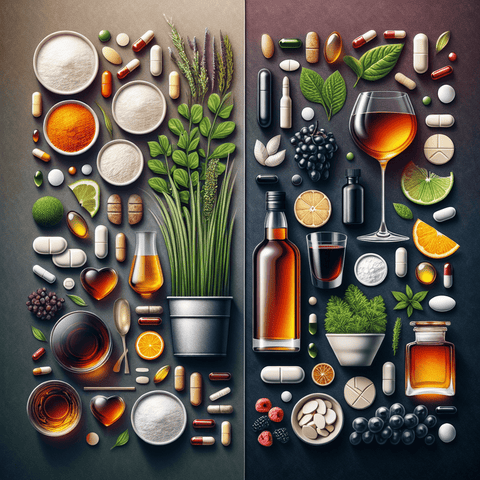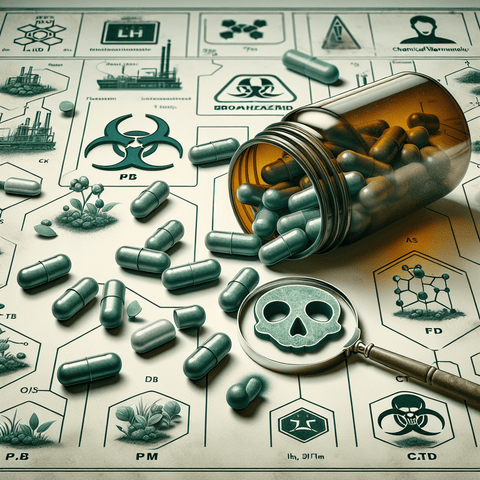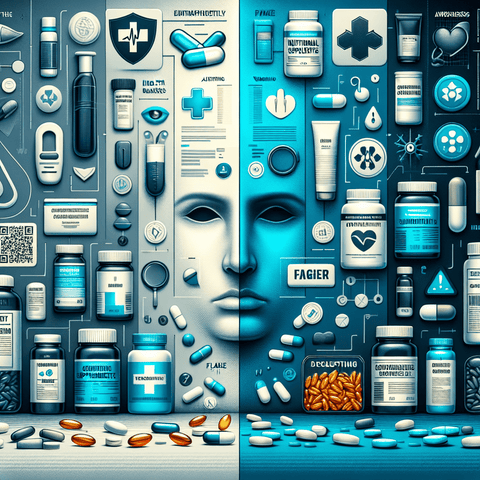Introduction
Nutritional supplements have gained remarkable popularity over the past few decades. From multivitamins and herbal remedies to targeted supplements like vitamin D, magnesium, and omega-3 fatty acids, many people incorporate these products into their daily routines in hopes of optimizing their health, boosting immunity, and supporting overall well-being. This surge in supplement use has also sparked a fair amount of concern—especially when it comes to combining supplements with alcohol. Drinking alcohol is a common part of daily life for many, whether it’s a casual glass of wine at dinner, a celebratory cocktail, or a weekend out with friends. But how does alcohol fit into routines that also feature nutritional supplements? Is it safe to mix the two? Could combining alcohol with vitamins or herbals undermine your health goals—or worse, harm your body? This blog dives into an often-overlooked topic: the interaction between supplements and alcohol. We'll explore what the science says, explain the possible risks, and offer expert-backed guidelines to keep you safe. Understanding how and when to combine supplements with alcohol can make all the difference in supporting your health without accidentally creating unwanted side effects. If you're someone who takes vitamins or herbal remedies and occasionally enjoys an alcoholic beverage—or if you're trying to stay healthy while engaging socially—this article is for you. We'll break down the complex interaction between nutrients and alcohol with clear, actionable advice. After reading, you'll be empowered with the knowledge to make informed decisions that align with your wellness goals.Supplements and Alcohol: Can They Be Safely Combined?
To address the question of whether supplements can be safely consumed with alcohol, we need to understand what constitutes a "supplement" and how each might be affected by alcohol consumption. Supplements include a broad range of products, such as vitamins (A, B-complex, C, D, E, K), minerals (calcium, magnesium, zinc), herbs (St. John's wort, ginseng), amino acids, probiotics, and omega-3 fatty acids. Each of these substances affects the body in different ways, and alcohol—a central nervous system depressant—can interact with them across several biological pathways. Alcohol is metabolized mainly by the liver, where enzymes break it down into acetaldehyde (a toxic compound), then further into acetate. During this process, alcohol can slow down or accelerate certain metabolic functions depending on its concentration and the individual's physiology. Notably, liver function is central to the metabolism of both alcohol and many vitamins and herbal compounds, which creates potential for interaction. Some categories of supplements are particularly affected by alcohol: - **B vitamins**, especially B1 (thiamine), B6, and folate, are significantly depleted by alcohol consumption. - **Antioxidants**, such as vitamins C and E, may be used up faster due to oxidative stress caused by alcohol. - **Fat-soluble vitamins** (A, D, E, K) may not be absorbed properly due to alcohol’s impact on fat metabolism and digestion. - **Herbal adaptogens**, such as Ashwagandha, Rhodiola, and especially kava or valerian root, can depress the central nervous system when combined with alcohol, amplifying sedative effects. Risk factors for negative interactions include: - **Dosage**: High doses of supplements or high alcohol intake increases the risk of adverse reactions. - **Frequency**: Chronic drinkers are more likely to experience long-term nutrient depletion. - **Health Conditions**: Individuals with liver or gastrointestinal issues have reduced alcohol and nutrient metabolism capabilities. - **Age**: Older adults metabolize substances differently and are at increased risk of drug-nutrient-alcohol interactions. In short, while some supplements may be safely taken hours before or after a drink, others may interact more seriously and should be avoided. Understanding these mechanisms is vital for making safe and effective choices.Alcohol and Vitamins Interaction: What the Science Says
Many vitamins play essential roles in bodily functions, from energy production to immune defense, neurological health, and bone maintenance. Alcohol’s interference in nutrient absorption, transport, and metabolism is well documented both anecdotally and in scientific research. Let’s dive into how alcohol affects specific vitamins: - **Vitamin B1 (Thiamine)**: Thiamine is essential for brain and nerve function. Alcohol inhibits its absorption in the gastrointestinal tract and can lead to Wernicke-Korsakoff Syndrome in extreme cases. This combination is particularly risky for regular or heavy drinkers. - **Folate (Vitamin B9)**: Alcohol reduces folate absorption and increases its excretion through urine. Folate deficiency is linked to anemia, fatigue, and neural development issues in pregnancy. - **Vitamin D**: This fat-soluble vitamin supports immunity and bone health. Alcohol can impair the liver’s ability to convert vitamin D into its active form, reducing efficacy. For those who drink and take vitamin D, choosing a high-quality supplement from our Vitamin D Collection may help offset deficiencies. - **Vitamin A**: High doses of vitamin A combined with alcohol can be toxic to the liver. Both substances are metabolized in similar pathways, raising the risk of toxicity. - **Vitamin C and E**: These water- and fat-soluble antioxidants help combat alcohol-induced oxidative stress. However, chronic drinking may heighten requirements, meaning more might be needed to experience benefits. Our Vitamin C supplements support antioxidant defenses in these scenarios. - **Vitamin K**: Vital for blood clotting and bone metabolism. While not as prominently affected by alcohol as others, deficient levels over time—especially in combination with poor diet—can cause complications. Consider our vetted Vitamin K options if you're concerned. Scientific studies support the notion that even moderate alcohol consumption can significantly reduce levels of several essential vitamins. Heavy drinking especially depletes water-soluble vitamins such as the B-complex and C, which aren't stored in the body and must be replenished regularly. Overall, nutrition and supplementation goals may be compromised if alcohol is routinely consumed without strategic planning or guidance. If you're relying on supplements to correct or prevent nutrient deficiencies, chronic alcohol consumption may offset those efforts without you realizing.Mixing Supplements With Alcohol: Myths vs. Facts
Myths and misinformation about combining alcohol and supplements are widespread. Let’s clear the confusion with evidence-based analysis. Myth #1: Natural supplements are always safe with alcohol.Many people believe that “natural” equates to “harmless,” but this is not necessarily true. Herbal supplements like St. John’s wort, valerian, and kava can interact dangerously with alcohol. For example, kava and valerian are both sedatives; when taken with alcohol, they may over-suppress the nervous system, causing excessive drowsiness, impaired coordination, and in extreme cases, respiratory depression. Myth #2: Multivitamins will protect me from alcohol damage.
While multivitamins can help support nutrient intake, they can’t prevent or counteract the oxidative stress and cellular damage caused by alcohol. They’re not a free pass to drink more. Multivitamins are best seen as supportive tools, not cures or antidotes to alcohol's effects. Myth #3: It’s fine to take liver detox supplements while drinking.
Timing matters. Liver-supporting supplements like milk thistle or N-acetylcysteine (NAC) may help the body process toxins, but combining them simultaneously with alcohol may put strain on liver enzymes. It’s best to consume these away from alcohol intake and consult a healthcare provider. Real risks of mixing supplements and alcohol include: - Exacerbated sedative effects (herbals like valerian + ethanol) - Reduced bioavailability of vitamins (alcohol impairs nutrient absorption) - Liver enzyme interference (alcohol competes for metabolization pathways) - Mental health side effects (alcohol with 5-HTP or tryptophan compounds) A popular trend is taking “pre-game” vitamins in an attempt to hedge against hangovers. While vitamins such as B6 and C might marginally reduce the intensity of a hangover due to antioxidant effects, there’s insufficient evidence to claim direct prevention. Similarly, digestion “detox” kits or next-morning regimens may only provide modest relief. When selecting supplements to support recovery post-drinking, consider adding key nutrients like magnesium, which supports muscle recovery and nerve health after dehydration and oxidative stress from alcohol. Visit our Magnesium range for targeted recovery solutions.
Supplement Safety With Alcohol: Guidelines to Follow
To reduce the risk of adverse outcomes when combining supplements and alcohol, consider these practical safety guidelines: 1. Timing MattersAvoid taking supplements at the same time as alcohol. A common rule of thumb is to separate intake by at least 4–6 hours, depending on the supplement. Fat-soluble vitamins (A, D, E, K) taken with alcohol, for example, may not be absorbed efficiently. Spacing doses can reduce interference and side effects. 2. Watch for Symptoms
Early signs of interaction may include nausea, flushing, dizziness, or gastrointestinal upset. For liver-stressing combinations (e.g., vitamin A and alcohol), fatigue, yellowing of the skin, or right-side abdominal pain may occur—require immediate medical attention. 3. Read Labels Carefully
Some supplements come with warnings regarding alcohol interactions. Pay attention to these and integrate this information into your wellness decisions. 4. Prioritize Medical Advice
Always consult a qualified healthcare provider—especially if you're taking prescription medications or managing conditions like liver disease, depression, or cardiovascular issues. 5. Avoid High-Risk Pairings
Don’t mix alcohol with CNS depressants like melatonin, valerian, chamomile, or kava supplements. These combinations can dangerously suppress breathing or amplify alcohol’s effects. 6. Consistency is Key
If taking supplements for a specific therapeutic reason (such as correcting deficiency, supporting bone health, or balancing mood), erratic alcohol intake may lower treatment success. Maintain consistent routines and consider alcohol a variable that can interrupt progress. Ultimately, the safest route is to space out alcohol and supplements, be aware of your intake levels, and know your body. Supplementation should work with your lifestyle—not against it.
Alcohol Impact on Nutrition: Understanding the Bigger Picture
Beyond interactions with specific supplements, alcohol triggers a wide array of general effects on the body’s nutritional status: 1. Impaired Absorption and DigestionAlcohol inflames the gastrointestinal tract and damages the stomach lining, reducing your ability to digest and absorb nutrients, especially important micronutrients such as folate, magnesium, and zinc. For magnesium—critical in muscle and bone health—the impact is even more notable. Ensure adequate intake via our Magnesium assortment. 2. Liver Stress and Organ Function
The liver is a central organ in processing nutrients. By overwhelming detox pathways, alcohol distracts the liver from regular nutrient conversions, especially vitamin D and omega-3 processing. Consider DHA and EPA products from our Omega-3 range to support cognitive and cardiovascular health during alcohol moderation. 3. Gut Microbiome Disruption
Emerging research highlights how alcohol disrupts gut flora, reducing microbial diversity and impairing digestion and immunity. Probiotic supplementation may ease this imbalance, though it should be used under the guidance of a healthcare provider. 4. Energy and Nutrient Depletion
Alcohol contains "empty" calories—high energy, low nutritional value—that can replace nutritious meals. Over time, poor dietary patterns catalyzed by alcohol consumption can lead to chronic deficiencies despite supplementation. Nutrition doesn’t just involve adding nutrients—it’s about ensuring your body can use them. When alcohol undermines nutrient availability, the best supplements can only go so far. A holistic dietary plan, based on whole foods, moderate drinking, and targeted supplementation, is essential for optimal health.
Drinking While Taking Supplements: What You Need to Know
After reviewing the science, it’s clear that alcohol and supplements mix best with caution. Here's what you need to know to maintain a balance between wellness and occasional indulgence: 1. Know Your LimitsOne drink occasionally may not impact your supplement regimen meaningfully—but more than that, especially regularly, might start to impair absorption, metabolism, or your goals altogether. 2. Be Mindful of Your Demographic
- **Pregnant Individuals** should avoid both alcohol and certain supplements. - **Athletes** who rely on nutrition for performance should moderate alcohol completely. - **Older Adults** must monitor liver function, medication intake, and nutrient balance. - **Chronic Illness Patients**, especially those with liver or gastrointestinal issues, should discuss any alcohol and supplement use with their doctor. 3. Do’s and Don’ts Summary
- ✅ Do space alcohol and supplements apart - ✅ Do choose high-quality supplements - ✅ Do consult a healthcare provider when in doubt - ❌ Don’t mix CNS depressants with alcohol - ❌ Don’t assume supplement use offsets alcohol risks - ❌ Don’t ignore symptoms like nausea, fatigue, or dizziness after combining Think critically about your health goals—whether it’s improving energy, supporting gut health, or enhancing immunity—and ask whether alcohol habits support or hinder those aims. The answer is often simple with planning and guidance.
Conclusion
Supplements and alcohol both impact your body in powerful ways. While one may provide nutritional benefits, the other can deplete vital resources and strain crucial systems like the liver and gastrointestinal tract. Together, they may interact—sometimes subtly, other times with clear and dangerous results. Combining alcohol and supplements should never be done without awareness and intention. By understanding absorption mechanics, known risks, and best practices, you’ll be equipped to build a supplement strategy that continues to work—even with occasional alcohol consumption. Before altering your routine or combining new supplements with social drinking, always seek personalized advice from your healthcare provider. For nutritional needs including vitamin C, D, K, omega-3s, and magnesium, browse our carefully curated collections at TopVitamine.com to find products that align with your lifestyle and goals.Q&A Section
Q: Can I take a vitamin supplement right before drinking alcohol?A: It's recommended to space supplements and alcohol by at least 4–6 hours to minimize possible absorption conflicts or side effects. Q: Does alcohol cancel out vitamin benefits?
A: Not necessarily, but it can impair absorption and deplete water-soluble vitamins, reducing the effectiveness of supplementation. Q: Are there any supplements that should never be mixed with alcohol?
A: Yes, especially CNS depressants such as melatonin, kava, valerian, and GABA-based supplements. These can dangerously amplify alcohol's sedative effects. Q: What supplements support recovery after alcohol consumption?
A: Vitamins C, B-complex, magnesium, omega-3s, and liver-supporting herbs like milk thistle post-alcohol can aid recovery—but always take caution. Q: Do multivitamins help prevent hangovers?
A: There's limited evidence. They may support nutrient replenishment but are not proven hangover cures.



